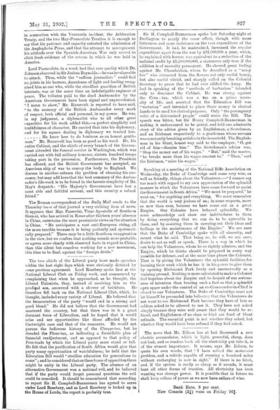Lord Pauncefote, in a word, had that rare quality which
Dr. Johnson observed in Sir Joshua Reynolds,—he was invulnerable to attack. Thus, while the " saffron journalists " could find no joints in his harness, Americans of light and leading recog- nised him as one who, while the steadfast guardian of British interests, was at the same time an indefatigable engineer of peace. The tributes paid to the dead Ambassador by the American Government have been signal and unprecedented. "I mean to show," Mr. Roosevelt is reported to have said, " to the memory of the British Ambassador every mark of respect, both official and personal, in my power. He was, in my judgment, a diplomatist who to all other great capacities for his work added this,—a perfect simplicity and truthfulness of character. He carried that into his diplomacy, and for his square dealing in diplomacy we trusted him.
He knew how to do business as an honest gentle- man." Mr. Roosevelt has been as good as his word. He, his entire Cabinet, and the chiefs of every branch of the Govern- ment attended the funeral service in Washington, which was carried out with full military honours, sixteen hundred troops taking part in the procession. Furthermore, the President has offered, and the British Government has accepted, an American ship of war to convey the body to England. We discuss in another column the problem of choosing his suc- cessor, but may add here that the best summary of the Ambas- sador's life-work is to be found in the laconic simplicity of Mr. Hay's despatch: "His Majesty's Government have lost a most able and faithful servant, and this country a valued friend."










































 Previous page
Previous page